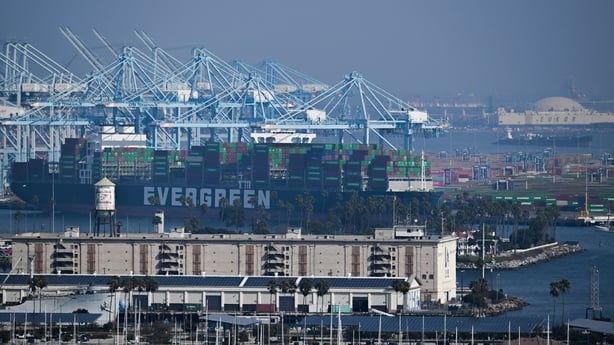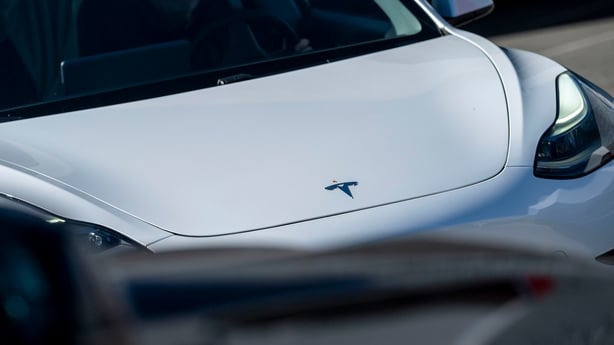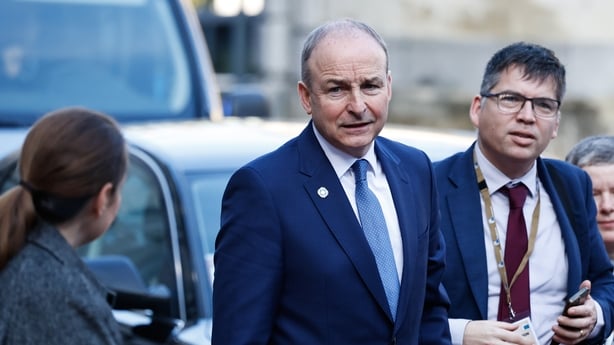EU leaders were relieved when Donald Trump failed to mention tariffs on European goods during his inauguration speech on 20 January.
That relief was short-lived as the US President stepped off Air Force One at Joint Base Andrews in Maryland in the early hours of the morning.
"It will definitely happen with the European Union," he responded to reporters.
"I can tell you that, because they've really taken advantage of us," he added.
He spoke of a $300 billion (€261 billion) trade deficit with the EU.
"They don't take our cars. They don't take our farm products. They take almost nothing and we take everything from them," Mr Trump said, adding "millions of cars, tremendous amounts of food and farm products".
"The European Union is really out of line," he added.
In fact, the trade deficit is less than half that claimed by Mr Trump.
The Office of the United States Trade Representative puts Europe's trade surplus with the US at $131.3 billion in goods; the US actually enjoys a trade surplus of $71.2 billion in services (these services increased by nearly 20% in 2022).

The writing was on the wall in Davos.
Mr Trump complained repeatedly about the EU, saying it "treats us very, very unfairly".
There was a litany of gripes, from the controversy over the sea wall at his golf links in Doonbeg, Co Clare, (nothing to do with the EU), to VAT, to the trade deficit, to the EU's tax on digital services, to the European Commission investigations into Apple, Google and so on.
Despite that, trying to second guess Mr Trump's impulsive policy making is a treacherous business.
Economists have almost universally criticised Mr Trump's use of the tariff cudgel, saying it will shatter well established and functioning supply chains between the US, Mexico and Canada.
That will certainly hurt Canada and Mexico but also US manufacturers and consumers.
It is true that US trade deficits with the EU, Canada and Mexico have widened since 2016, yet in the case of Canada and Mexico - Mr Trump's apparent ire is directed at illegal migration and the smuggling of fentanyl, rather than rebalancing trade.
Yet, a paltry amount of fentanyl is thought to have come across the US-Canada border.
As such, the sweeping tariffs on one of the US's closest allies appear petulant and vindictive, with some even suggesting that Mr Trump wants to degrade the Canadian economy in order to claim it as the 51st state.
By contrast, Mr Trump has gone relatively easy on China, his sworn rival, hitting exports with just 10% in tariffs.
Economist Paul Krugman, in a Substack post, suggested that Mr Trump was going easy on China to sweeten up Elon Musk and avoid any danger to sales of his Tesla vehicles there.

He went further and suggested that large anonymous buyers of millions of dollars of Mr Trump's - and his wife Melania's - personalised bitcoins could, in fact, be proxies for the Chinese government.
The rationale? Such transactions would both enrich the US President and protect China from the worst tariff increases.
Mr Krugman admits he has no proof of this, but the Nobel Laureate suggests it is "plausible".
By late afternoon yesterday, Mr Trump suddenly announced he would pause the 25% tariffs on Mexico and Canada by one-month after the Mexican government promised to send 10,000 National Guard members to the US border to crack down on illegal migration and smuggling.
After a call with the US President, Canadian Prime Minister Justin Trudeau said that Canada would deploy nearly 10,000 frontline officers to help secure the border, list drug cartels as terrorists, appoint a "Fentanyl Czar" and crack down on money laundering.
This, then, jolted the world back to the narrative that Mr Trump was ultimately using threats and bluster to secure wins that would look good to his base.
Read more:
US tariffs on Chinese imports take effect after Trump reprieves Canada and Mexico
Taoiseach cautions on Trump response, says European unity essential
Trump says tariff 'pain' will be 'worth the price'
"Trump's initial focus on Canada and Mexico, two US partners, could be less counterintuitive than it looks," suggests Agathe Demarais, senior policy fellow at the European Council on Foreign Relations (ECFR).
"Trump knows that he may be able to extract quick concessions from these economies (for instance on migrant flows or fentanyl trade from Mexico), something that he would see as a major win for US domestic political purposes," she added.
The European Union can't pull off a trapeze act like the Mexicans when it comes to its trade surplus, however.
The European Commission has already launched plans to buy more US liquified natural gas (LNG), but that may not be a workable transaction, not least because companies buy gas with price in mind, not politics.
"It is unclear what the EU could offer Trump in a bid to dodge the tariff bullet," says Ms Demaris.
"European hopes that pledges to boost imports of US liquefied natural gas (LNG) will be enough are unrealistic. The only way for Brussels to force European energy firms to import more US LNG would be to ban Russian LNG imports - an unlikely prospect at this stage."

Europe could butter Mr Trump up further by promising to buy more US defence equipment.
While EU leaders gathering in Brussels were railroaded by the tariff threat, they are in town to have a frank and free-flowing discussion about the future of European defence and the issue of whether to invest more in the EU's own defence champions, or to continue to buy proven US military supplies off the shelf, is at the heart of the debate.
While France is pushing for any joint EU borrowing to be steered towards Europe’s indigenous arms industry, many member states believe that US production will be both cheaper, more quickly available and more reliable.
However, for the EU to veer off in that direction could take months if not years; Mexico can send 10,000 guardsmen to the US border overnight.
The European Commission has repeatedly warned it will retaliate if Mr Trump hits the tariff button. Teams are said to have for months scoped various products and sectors that can be hit, with tariffs of up to 50% if necessary.
In 2018, when Mr Trump slapped tariffs on European steel and aluminium for "national security" reasons, the EU responded with tariffs on Levi Jeans, Jack Daniels and Harley Davidsons - products putatively associated with voters in Republican controlled states.
At yesterday’s summit, the watch word was European unity, as a prerequisite for any European response.
Mr Trump will undoubtedly look to shatter that unity; he is already a past master at stroking the egos of populist leaders like Viktor Orban, the Hungarian prime minister.
Europe's main problem is bandwidth: The Trump presidency, just days old, already has the potential to really rattle the EU across a range of policy areas: Ukraine, defence, regulating the tech sector, restoring trade and democracy norms.
As Brussels and EU capitals wait for the tariff axe to fall, EU leaders believe unity and resilience will be needed at levels not seen since the Covid pandemic.
"What is essential is that the European Union acts as one and will act as one," Taoiseach Micheál Martin said on arrival at the summit. "In unity, there is strength."
Whether that unity holds is another question.







